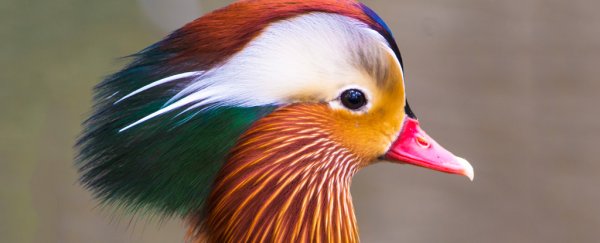At first glance, you might miss it. But among Central Park's usual waterfowl crowd, there appears to be a new addition. And people are flocking to see him.
A single, male Mandarin duck flaunts his multi-coloured feathers as he swims out among a posse of mallards and wood ducks. He's not a local, and it's a mystery as to how he arrived.
The hypothesis that he escaped from a zoo or sanctuary has been ruled out so far. And since ducks aren't allowed as pets in New York City, that theory also stands on shaky ground.
The duck was first spotted about a month ago by birdwatchers who frequent the park, but he fell off the grid for two weeks and reappeared a week or so ago.
Since then, he's been traversing different bodies of water throughout the park. The twitter account Manhattan Bird Alert tweets out the location of the duck from time to time.
Huge crowds from all over New York City, of all ages, have turned up in the past weekend to see the duck.
The Mandarin duck's favourite hang-out spot, the pond by 59th street and 5th avenue, drew a crowd that lined the entire perimeter of the waterfront on Saturday.
Spectators wait patiently, with cameras, binoculars, and scopes for the duck to leave his asylum on a shaded rock island that sits at the visually obscured part of the pond-where he preens his resplendent coat-and swim out to greet his fans.
The duck has become Twitter famous as well, ever since The New York Times published an article that drew in a flurry of shares all over social media.
I went to see him this weekend, and he was truly spectacular. His stark and striking plumage consists of brilliant orange, white, blue, and violet.
The Mandarin duck is native to east Asia – found in China, Korea, Japan, and parts of Russia. It's a migratory bird that weighs around 600 grams, or a little more than a pound. It's slightly smaller and lighter than the standard mallard.
Mandarin ducks tend to be a bit introverted by nature, according The Wildlife Trusts, and like to hide behind overhanging willows. They eat water plants, rice, grains, pests, and some small fish and mollusks, and live for about 6 years.
Mandarin ducks prefer wooded freshwater ponds or marshes. That's due to a quirk these ducks have – they like to nest in holes high up in trees. After the ducklings hatch, the mother duck coaxes them to jump down from the nest. They share this trait with the wood duck, a close relative.
 (Charlotte Hu/Business Insider)
(Charlotte Hu/Business Insider)
Male and female Mandarin ducks share an elaborate courtship ritual before forming monogamous pairs at the beginning of winter. Because of this, Mandarin ducks in China are a symbol of love and healthy relationships.
The Central Park Mandarin duck, however, still seems to be living out his bachelor days leisuring by the pond-side and bathing in attention.
In the wake of his growing celebrity, the New York City Parks Twitter account tweeted a request to visitors, asking them to "please remember to enjoy our new friend from a distance and do not feed him."
This article was originally published by Business Insider.
More from Business Insider:
